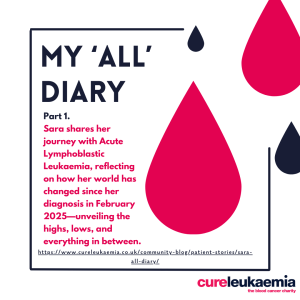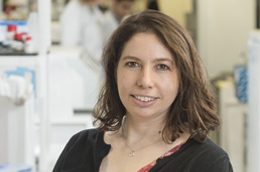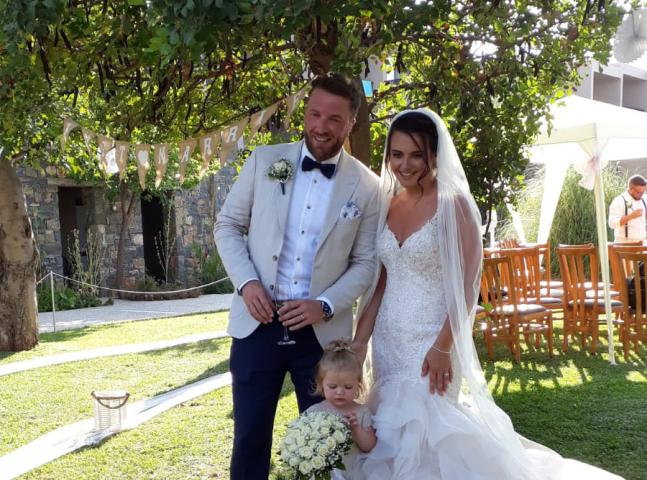
Sara’s ALL Diary – Part 1
Diary of Sara, an Acute Lymphoblastic Leukaemia (ALL) Patient.
It’s been a rollercoaster for Mark Rankin in his blood cancer journey – but he’s now very happy to be at a restful stage of the ride.
Mark was a new dad, at 32, to daughter Harper, when he was given the devastating news that he had chronic myeloid leukaemia (CML). The diagnosis, following blood tests, was thankfully a swift one due to Mark’s swift response to finding a lump under his ribcage, His ingenuity was born out of lessons preached by his mother who was prompt in getting help after being diagnosed with cervical cancer 20 years previous.
The lump ended up being an enlarged spleen – and, after being handed the bombshell update on the reasons for it – he seized the day with his standard positive approach.
He said: “It was about trying to remain as positive as possible and the news from consultants at Monklands Hospital was extremely optimistic – first because it was caught early and second because of the progress and advancements they’ve made with the inhibitors to help CML since the turn of the century.
“So, after feeling sorry for myself for a few weeks I then had it in my head that whatever challenges came my way, I just had to meet them head on and look forward instead of dwelling on what had happened to me.
“You ask yourself ‘why me, why now, why do I deserve this’ but we all have to face challenges in life – it’s just a matter of how many and how we deal with them.”
Progress was good to begin with as his initial medication came with very little cost to his standard of life.
He continued: “When I began my medication, side effects from the first tablet were leg cramps, but nothing overwhelming.”
“After a couple of months, I got back to work and moved on with my life. The tablet started to work really well, at first, but progress slowed after 11 months and that’s when I moved onto my second line tablet.”
That was “extremely problematic” for Mark, from Motherwell – and came with mental challenges that tested his resolve.
He added: “Almost immediately I could see my skin changing – itchiness, redness and dry and patchy skin and it was very difficult to take.
“Not long after that my hair started to change rapidly. It had thinned and patches at the back had come out. That’s when I started to, for the first time in my life, experience challenges mentally with what I had been experiencing.
“It was a mental test as well as physical. It had almost come out of the blue and caught me completely off-guard.
“I persevered for a few more months but it became extremely difficult to manage a normal life alongside this tablet. With my wedding coming up in the summer of 2019, my consultant agreed to relax the dosage.”
That’s when life changed for Mark – as it coincided with him moving to Trials Acceleration Programme (TAP) centre, Beatson West of Scotland Cancer Centre under the amazing care of Professor Mhairi Copland.

What followed was a clinical trial – which tested two drugs Bosutinib and Asciminib, with 50% of patients receiving each drug with Bosutinib as the control arm of the trial.
Improvements were rapid and he hasn’t looked back since.
He said: “I was drawn at random to move onto Bosutinib – one of the more established drugs.
“Since then, it’s been brilliant. I have a journey into see the nurses and consultant once a month and I can’t thank them enough for how welcome they’ve made me feel.
“They’re all extremely cheery and the Clinical Research Unit do a fantastic job with everyone that comes in through their doors.”
“Even during the pandemic with new curveballs thrown their way, this lot haven’t changed how they operate. I’m sure it’s been a tough period for them individually and collectively as a team, but you wouldn’t know it.
“My nurse Julie MacDonald is a joy to see every month and I look forward to a blether with her and the rest of the nurses.”
Looking back now, as Mark recalls so vividly, the diagnosis came completely out of the blue – but he still stresses positivity as the key message to anyone unfortunate enough to follow in his footsteps down this difficult path.
He added: “But what it also makes you realise is how supportive and wonderful our NHS is. I can’t thank them enough for being there for me at different stages of my journey.”


How the VICTOR Trial Gave Nick a Second Chance
Notifications